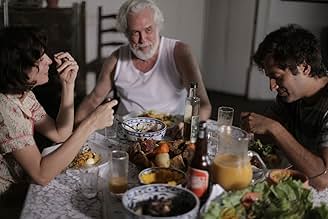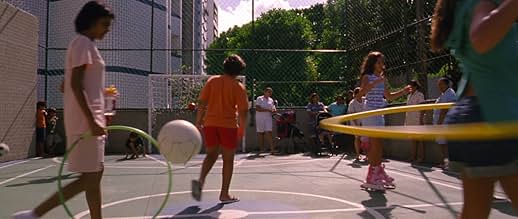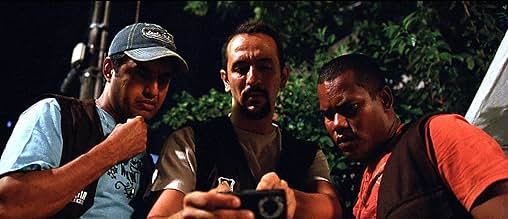The lives of the residents of a Brazilian apartment building and the security guards who get the job guarding the surrounding streets.The lives of the residents of a Brazilian apartment building and the security guards who get the job guarding the surrounding streets.The lives of the residents of a Brazilian apartment building and the security guards who get the job guarding the surrounding streets.
- Director
- Writer
- Stars
- Awards
- 39 wins & 23 nominations total
- Director
- Writer
- All cast & crew
- Production, box office & more at IMDbPro
Featured reviews
Decipher or be devoured
Wow, what an amazing film!
While this movie plays like a slice of life drama in a neighborhood in Recife, every single scene is carefully and meaningfully put together to speak about the nature of social structures in Brazil which date back to plantation times.
These things may be more discernible in Northeastern states like Pernambuco where the plantations once flourished and formed the basis of the societal constructs and defined human relationships, but their residue still permeates the country as a whole, which, while trying to move beyond them, still remains mired in the same kind of stratifications.
The film opens with black and white pictures of a plantation and then segues into a drama in 3 acts, using a crisscrossing narrative that delves into the day to day lives of various people who live and work on same street. And through their interactions and involvements we are given a very clear picture of class system as microcosm.
This film is more than a simple slice of life. For those of you familiar with the films of Lucrecia Martel (Argentina), what seems to be disconnected and inconsequential is put together like a jigsaw puzzle that leads brilliantly to the films final scene, at which point the entire story crystallizes before our very eyes, and we realize how well it has been supported and enriched by all we have been shown.
Throughout the film, there are narrative constructs for use to take hold of: the chapter headings, certain scenes that foreshadow, and a soundtrack the underscores where we are headed, without ever being exactly clear what we should prepare for. And this is, to a large part, the filmmaker's genius.
A daring debut
We take part on the daily lives of the residents, their aspirations and challenges as their characters are opened wide for us to study, judge and ponder upon.
These seemingly ordinary lives that these people lead, experience some sort of change when a street security team is hired to protect them and whilst watching this the question regarding where this is going did pop into my head, it is an area where the new director showed some mastery by not allowing the putting together of the pieces of the puzzle to affect the narrative as we were led to its dramatic conclusion.
An unusual but stimulating experience.
Beautiful Brazilian Movie
What does "security" really mean?
The setting for this movie is modern day Recife, Brazil. (Recife is a seaport at the easternmost tip of Brazil.) A better title for the movie would be "Neighborhood Sounds," because the sounds in this affluent neighborhood are intimately involved with the plot.
This is not a violent film. It doesn't take place in a favela, but rather in an affluent neighborhood. Still, violence is always lurking in the neighborhood, just off-screen. Every home has a security system, but any car parked in the street is fair game for thieves.
A security firm comes to the neighborhood, and most of the residents ante up the money to purchase their services. The security men appear honest and capable enough, and hiring them probably made sense. They become part of the neighborhood scene.
Meanwhile, life goes on around them. There's a dog that howls and barks all night, a woman who uses her vacuum to suck marijuana smoke out of her apartment, a pair of lovers, a deliveryman who delivers water and other substances on demand, and the locally influential man who walks past the "caution--sharks" sign to go swimming.
Matters come together in the end in a way I would never have predicted. I'm not going to spoil the ending by even hinting at it. However, it made sense once I thought about it.
We saw the film at the newly refurbished, excellent Dryden Theatre at Eastman House in Rochester, NY. However, it will work very well on DVD.
Did you know
- TriviaOfficial submission of Brazil to the Oscars 2014 best foreign language film category.
- Quotes
Tio Anco: Do you carry weapons, Clodoaldo?
Clodoaldo: To be honest, I can't really say yes and I can't really say no. But I'll show you our best weapon, which is this: a cell-phone. Me and the boys have all the contacts we need.
João: So, worst-case scenario, you throw the mobile at the bad guy, is that it?
Clodoaldo: Mr. João, please...
João: Then you run home and get the real thing. I'm just trying to understand.
Clodoaldo: I get it, I get it.
- ConnectionsFeatured in Pictures of Ghosts (2023)
- SoundtracksCadavres En Serie
From the soundtrack of the film
"Le Pacha", by Georges Lautner
Music by Michel Colombier and Serge Gainsbourg
(c) 1968 SIDOMUSIC B. LIECHTI & CIE
- How long is Neighboring Sounds?Powered by Alexa
Details
- Release date
- Country of origin
- Official site
- Languages
- Also known as
- Tiếng ồn nơi hàng xóm
- Filming locations
- Production companies
- See more company credits at IMDbPro
Box office
- Budget
- R$1,860,000 (estimated)
- Gross US & Canada
- $60,255
- Opening weekend US & Canada
- $12,666
- Aug 26, 2012
- Gross worldwide
- $467,491
- Runtime
- 2h 11m(131 min)
- Color
- Aspect ratio
- 2.35 : 1
























